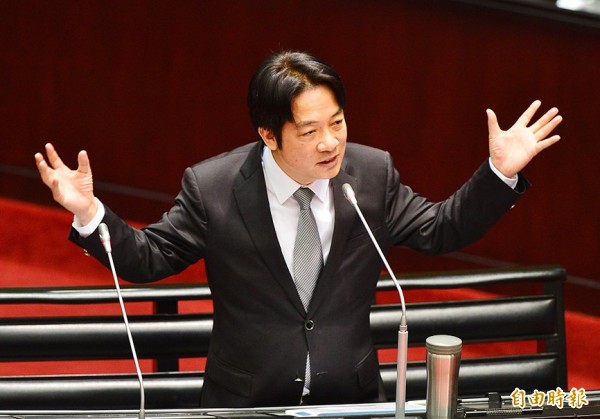《TAIPEI TIMES》 Task force to study PRC incentives

Premier William Lai answers a question during a question-and-answer session at the legislature in Taipei yesterday. Photo: Wang Yi-sung, Taipei Times
BRAIN DRAIN? New Power Party Legislator Hsu Yung-ming said Beijing’s efforts to attract Taiwanese could create a situation whereby Taiwan could not retain workers
By Peng Wan-hsin, Sean Lin and Jake Chung / Staff reporters, with staff writer and CNA
Premier William Lai (賴清德) yesterday said that the Executive Yuan has set up a task force to study a series of incentives for Taiwanese put forth by Beijing and their effects on Taiwan.
China’s Taiwan Affairs Office (TAO) on Wednesday announced 31 incentives to China-based Taiwanese in an attempt to attract Taiwanese enterprises, associations and artists.
TAO spokesman An Fengshan (安峰山) yesterday said the economic benefits and subsidies for Taiwanese individuals and businesses would allow them to compete on an equal footing with their Chinese counterparts.
The task force is to be overseen by Vice Premier Shih Jun-ji (施俊吉), Lai said during a question-and-answer session at the Legislative Yuan in Taipei.
“The task force was established to study the incentives offered by Beijing and compare China’s policy with that of Taiwan. We will review and adjust what should be revised,” Lai said.
“It is good if Taiwanese professionals are being enticed to develop in China for economic reasons, but it is not good if the measures are politically motivated,” Lai said. “Taiwanese must guard against this.”
New Power Party Legislator Hsu Yung-ming (徐永明) said that due to Beijing’s efforts to attract Taiwanese to work in China, it is possible that the nation would become unable to retain skilled workers.
Efforts to encourage increased investment in Taiwan should therefore be prioritized by the government, Hsu said.
“Only by growing stronger could we possibly hope to retain skilled workers at the international level,” Lai said.
Labor conditions in China are not necessarily better than those in Taiwan, the premier added.
In response to Chinese Nationalist Party (KMT) Legislator William Tseng’s (曾銘宗) questions on the matter, Lai said it is understandable that China would seek to further tap Taiwan’s talent pool.
“Without Taiwan’s help over the past several decades, could China have become what it is today? I hope that China will acknowledge this,” Lai said.
China’s economic development has benefited from Taiwanese capital, talent and technologies, Lai said, adding that he hopes Beijing would remember this when trying to bully Taiwan in the international community.
While President Tsai Ing-wen (蔡英文) has reiterated her pledge to maintain the cross-strait “status quo,” and pursue peaceful and stable development across the Taiwan Strait, China has not extended any goodwill toward Taiwan and has continued to boycott the nation’s membership of the WHO, the International Criminal Police Organization and the International Civil Aviation Organization, Lai said.
Quoting Tsai, Lai said that furthering cross-strait relations is not Taiwan’s unilateral responsibility — a remark seconded by Tseng.
新聞來源:TAIPEI TIMES















